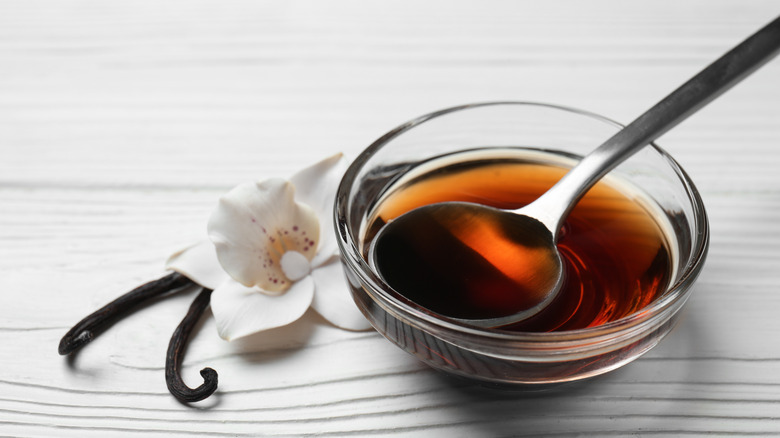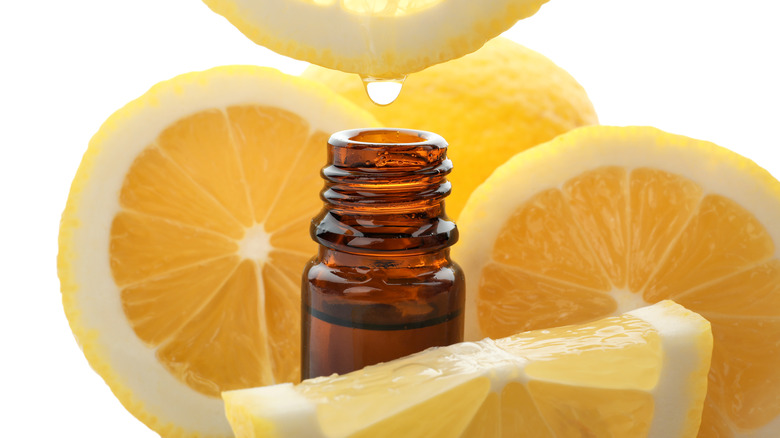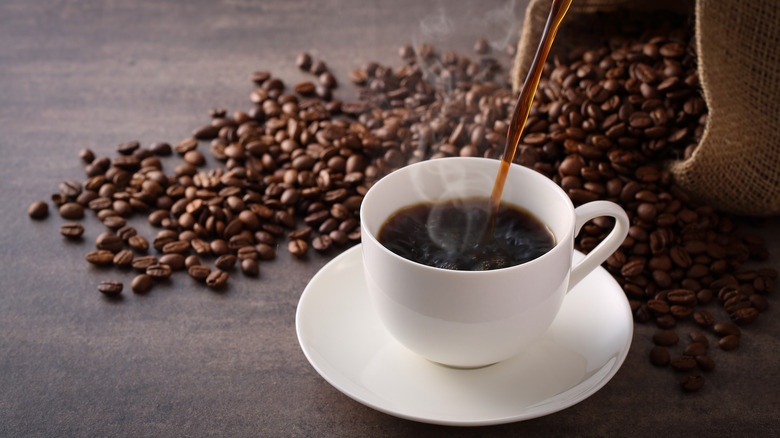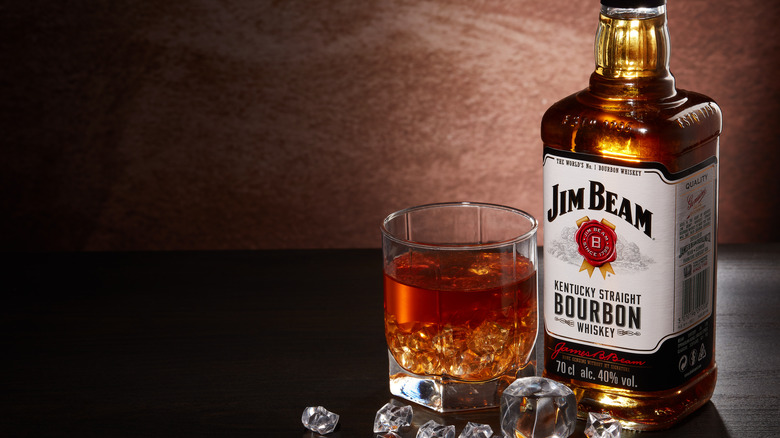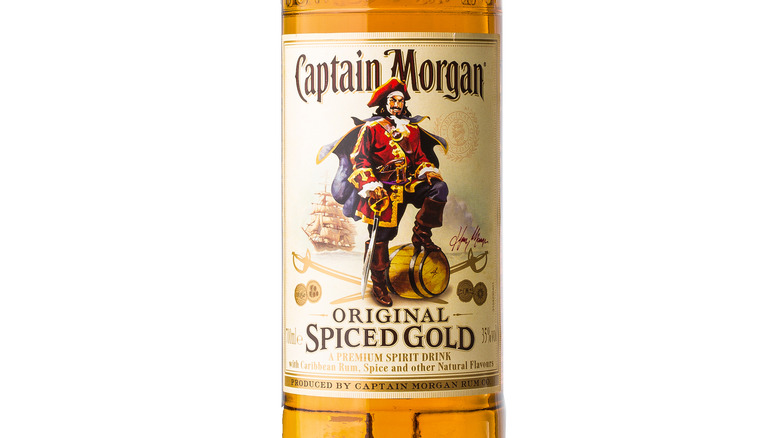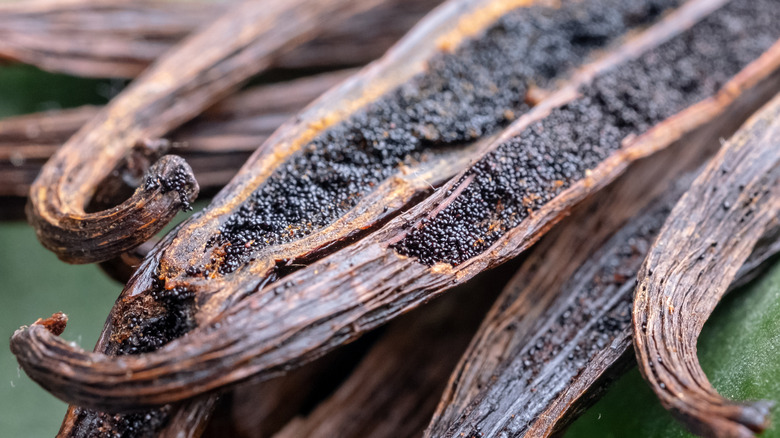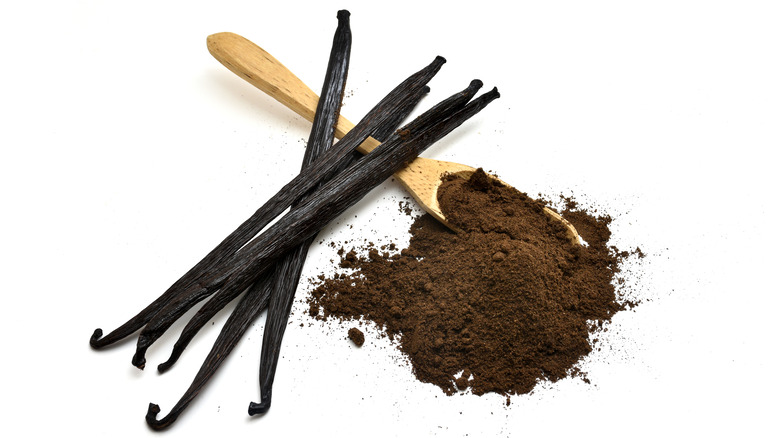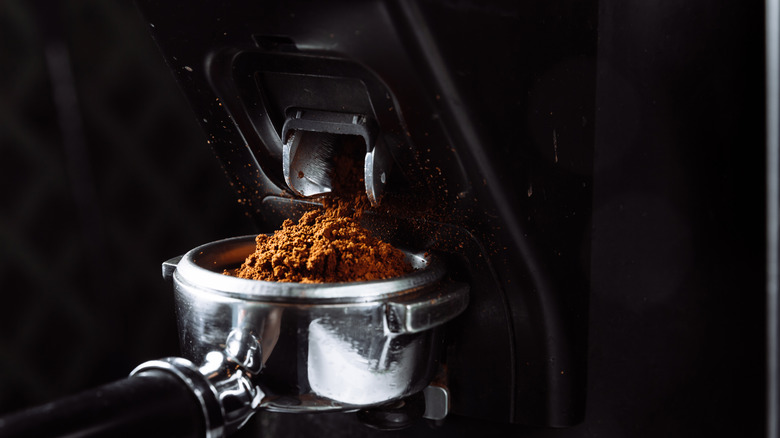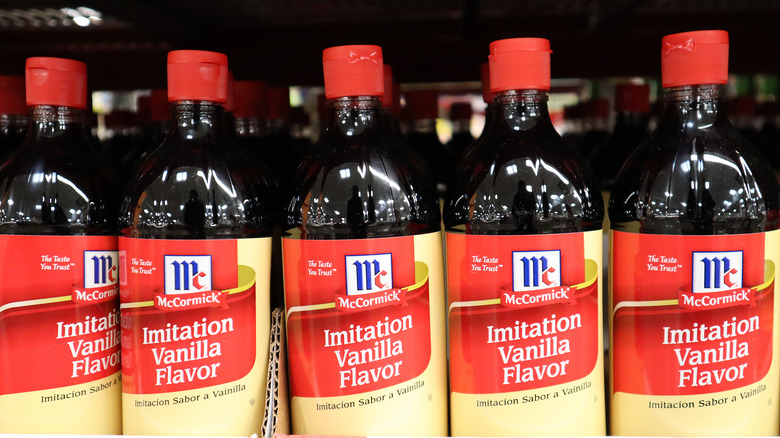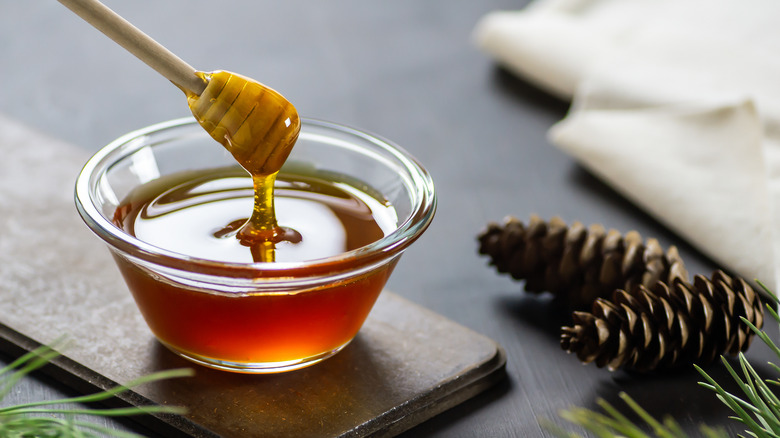10 Vanilla Extract Substitutes That Taste Like The Real Thing
Avid bakers will tell you, vanilla extract is an essential ingredient in so many of the sweet treats we all know and love. What's behind the magic? It's not so much the flavor of the extract itself, but the way it amplifies the flavor in other ingredients and adds that little something special that makes it so important.
But have you ever been craving some fresh baked cookies, only to realize the one ingredient you're missing is a teaspoon of vanilla extract? Or you've only got ½ a teaspoon left in the bottle that's already in your pantry? Doing a last minute shopping trip can be a major hassle. Not to mention, real vanilla extract is also very expensive due to its by-hand pollination and limited growing regions across the globe, so you might just be in the market for a cheaper option if you do a lot of baking. The good news is, there are less expensive alternatives, including some ingredients that are likely in your kitchen that you can easily use in its place.
So what are substitutes for vanilla extract that taste pretty close to the real deal? Keep reading to learn our top suggestions, and how to best utilize them for the recipe you're tackling.
Almond extract
Just as there are a ton of recipes that call for vanilla extract, there are also a good amount with almond extract on the ingredient list. Baking enthusiasts likely have both in their pantries at any given time but if there's a day when you're out of vanilla extract but still have some almond extract left, you can use that instead.
According to The Kitchn, the ratio is one-for-one in the majority of recipes. Sub in almond extract in the exact amount of vanilla extract called for, or even use a combination of both — an additional half teaspoon of almond extract is definitely enough to give a nutty punch to the baked goods.
Almond extract is also cheaper than vanilla extract, so if you're trying to stick to a certain budget at the grocery store but still want to bake up a storm, it is an alternative you should consider.
Lemon extract
Another potential swap for vanilla extract, if the need arises, is lemon extract, which you might already have stashed in the back of the cabinet (via Leaf). It's important to keep in mind that while vanilla extract is not necessarily sweet, it is slightly less bitter than lemon extract. If you're going to use lemon extract instead of vanilla extract in a one-to-one swap for a baked good, the final product could come out a little more bitter and potentially more acidic-tasting. However, usually the sugar the recipe calls for creates a nice contrast with the lemon flavor, and provides enough sweetness to counterbalance any bitterness. Still, you might want to add more sugar or less lemon extract depending on what you're baking. (Amping up the citrus flavor in lemon gooey butter cookies is certainly not a bad thing.)
Definitely do not use lemon juice thinking it's on par with lemon extract. It's totally a different ingredient and might disrupt the flow of the recipe.
Coffee extract
You might not have known it was a thing, but coffee extract is a solid baking addition and a way cheaper alternative to vanilla extract. Plus, you can easily make it at home (which is helpful since it's not always readily available in mainstream grocery stores). Much like vanilla extract, it works well to enhance the flavor of a lot of homemade desserts, especially chocolate ones. In fact, chocolate and coffee extract are a match baked in heaven.
Order coffee extract online or, if you want to make coffee extract at home, you can follow this recipe from Saving Room for Dessert. Simply combine gently crushed coffee beans in an airtight jar with vodka, let sit for a week on the counter, gently shaking about once a day, then strain the entire jar through a fine mesh sieve into a bottle you can seal and store.
It's a one-for-one substitute for vanilla extract, so certainly consider it as an option for when you're in a baking bind and need a comparable ingredient.
Bourbon
Got everything you need to make that delicious chocolate chunk cookie recipe ... except vanilla extract? Try raiding the liquor cabinet for the popular dark tipple so many people usually have just laying around, killing time till the next party: bourbon. Since vanilla extract is essentially produced by soaking vanilla beans in alcohol, it's no surprise that bourbon, which features notes of vanilla, is a viable substitute in certain recipes.
It really shines as a swap for vanilla extract in recipes that involve caramel, molasses, or toffee (via MyRecipes). The ratio is an even swap, just be mindful of what you're making. There are times when bourbon might not do the trick, particularly if you're really trying to sell the vanilla component of an item. While homemade vanilla ice cream might not be the best time to experiment with using bourbon instead of vanilla extract, a batch of cookies is ideal. Give it a go and expect some tasty results.
Spiced rum
Bourbon isn't the only dark liquor that can be a safe bet when trying to find a quick replacement for vanilla extract. You can also use rum as a substitute for your recipe in a one-for-one switch. It can be a much cheaper alternative than vanilla extract depending on what bottle you go with — it doesn't have to be the top shelf stuff.
If you really want to get creative and happen to have vanilla beans on hand, you can make your own extract. The vanilla lovers over at Vanilla Pura offer up a recipe for making vanilla extract using spiced rum and vanilla beans. However, we maintain that if you've only got the rum on hand — really any kind of rum — it should suffice as a swap for vanilla extract. The alcohol flavor will dissipate during the baking process, and while the final product might not taste exactly the same without the vanilla, it should still be flavorful and enjoyable to eat.
Vanilla bean
When in doubt, go straight to the source. Yes, you can actually enhance the flavors of your cakes, cookies, and muffins, and even get the cool visual component of seeing little black flecks to really showcase that vanilla, by using a vanilla bean in place of vanilla extract. One vanilla bean equates to roughly three teaspoons of vanilla extract. Gently slice open the bean with a paring knife then scrape the beans out — about two inches worth of beans could be considered a teaspoon of vanilla for your recipe (via The Kitchn).
You can also create your own vanilla extract if you're looking to save costs in the long-run. This Ina Garten recipe (via Food Network) requires no more than 12 vanilla beans and a bottle of vodka. (Keep in mind that it takes at least a month to fully come together.) Need the vanilla extract sooner? "Chop up the vanilla pods, and warm them in a small amount of vodka," one Redditor suggests. "I would only do this with a small amount. You won't be able to use immediately, but it'll be ready sooner than the few months in the regular process."
It's no surprise that vanilla beans are definitely one of the best swaps for the extract if you're trying to match flavor for flavor.
Vanilla powder
Vanilla powder is a baker's best kept secret. While vanilla extract is often the go-to on the ingredient list, a lot can be said for vanilla powder in certain scenarios. According to Food Republic, there are two types of vanilla powder out there — an off-white powder that's basically vanilla-infused sugar made with finely ground sucrose, maltodextrin, or dextrose; and dehydrated, ground vanilla beans, which is a fine black powder. The latter is a powerhouse of vanilla flavor. It's expensive to buy, but also possible to make on your own, especially if you already use vanilla beans. You can use a dehydrator to dehydrate the empty pods, then ground them in a spice grinder.
Vanilla powder or sugar should be available at high end grocery stores and markets, and is also an option for coating certain pastries and other baked goods, like churros. Vanilla extract isn't the only game in town, and subbing it for the powdered version might be fun to try on occasion regardless.
Espresso powder
A secret weapon in a lot of dessert recipes, espresso powder can definitely help to bring out other flavors without overpowering them, much like vanilla extract. For this reason, it's a viable substitute for vanilla extract that can easily blend with the wet or dry ingredients in cookies, cakes, brownies, muffins, and other treats. Using a small dash of it adds a subtle hint of coffee essence, depending on what you're whipping up and its other ingredients, but should by no means overpower the entire recipe.
Espresso powder is available to purchase in stores but can also be made in your own kitchen. If you want to make a DIY espresso powder created specifically for baking, Bright Eyed-Baker has an easy-to-follow recipe for it using leftover espresso grounds. Espresso powder, whether homemade or a store-bought, is definitely a flavor enhancer, and will work as a teaspoon-for-teaspoon swap with vanilla extract in a pinch.
Vanilla essence
Okay, so here's some real talk: Vanilla essence is basically a fancy way of saying imitation vanilla. And since vanilla is one of the priciest spices in the world (second only to saffron, per Bon Appétit), it makes sense that someone decided we needed to create a fake version in a lab. Vanilla essence is made with synthetic vanillin, and is definitely cheaper than the real deal beans that come from the vanilla plant. However, this doesn't mean it's a huge downgrade when it comes to flavor. In a lot of baked goods, you might not be able to even tell the difference between vanilla extract and vanilla essence.
So, if you're watching your pennies or the store is out of the real stuff and only has imitation vanilla, it can be a doable substitute in a recipe. In some cases it might even add a more profound vanilla flavoring, which could be beneficial for certain desserts.
Honey
If you're in a real jam, you can try swapping in honey for vanilla extract, but there are some caveats to keep in mind in terms of how it will impact the final taste and texture of the dessert you're baking. Honey is void of any water or alcohol, whereas vanilla is essentially the by-product of vanilla beans soaked in alcohol. Honey is sugar in a different form, and vanilla extract is flavoring.
But this doesn't mean it's a total no-go if you're in dire need of something to replace vanilla extract! According to a Redditor commenting on a thread about potentially replacing vanilla extract with honey, "Using honey will change both the flavour and texture of the final product. Will still taste good and is workable though. I'd throw in a dessert-spoon full and then add more to taste (unless you have a very strong/dark honey, the taste will not be as strong as vanilla ..."
The bottom line, honey is definitely sweeter, so you may want to consider reducing the amount of sugar in the recipe if you're going to try using it instead of vanilla.
